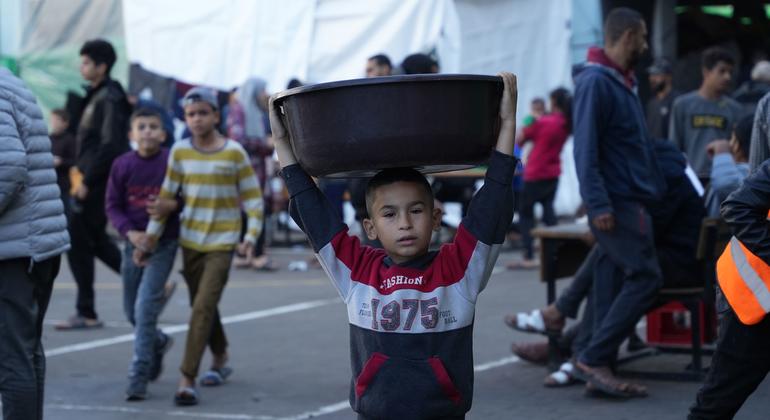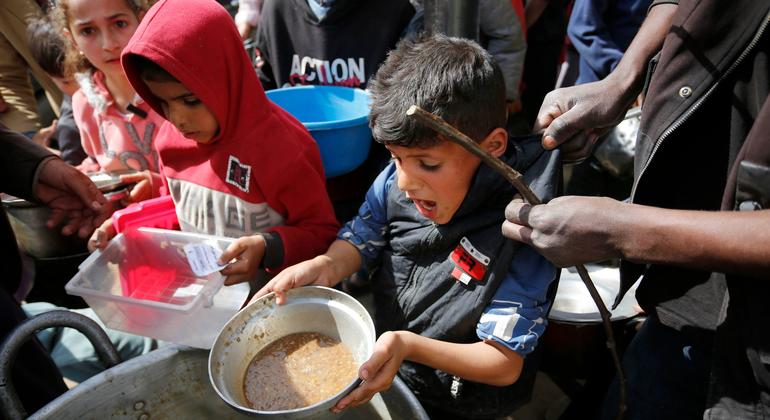“You’re speaking about the greatest crime against humanity ever committed,” said renowned historian Sir Hilary Beckles, who also chairs the Caribbean Community’s Reparations Commission, reflecting on the transatlantic trade that enslaved more than 10 million Africans over four centuries.
“One could say it was an institution that was abolished 200 years ago, but let me tell you this,” he explained, “there is no institution in modernity, in the last 500 years or so, that has changed the world as profoundly as the transatlantic slave trade and slavery.”
Remembering slavery in the 21st century
At a special General Assembly event for the International Day of Remembrance of the Victims of Slavery and the Transatlantic Slave Trade, marked annually on 25 March, guest speakers included Sir Beckles and 15-year-old activist Yolanda Renee King of the United States.
“I stand before you today as a proud descendent of enslaved people who resisted slavery and racism,” Ms. King told the world body.
“Like my grandparents, Dr. Martin Luther King Jr. and Coretta Scott King,” she said, “my parents, Martin Luther King III and Arndrea Waters King, have also dedicated their lives to putting an end to racism and all forms of bigotry and discrimination. Like them, I am committed to the fight against racial injustice and to carrying on the legacy of my grandparents.”
UN News caught up with Ms. King and Sir Beckles to ask them what the International Day of Remembrance meant to them.
Yolanda Renee King, youth activist and granddaughter of Dr. Martin Luther King, Jr. and Coretta Scott King, addresses the General Assembly.
UN News: The transatlantic trade in enslaved Africans was abolished centuries ago. Why is it still important for the world to remember it?
Sir Hilary Beckles: When we say centuries ago, yes, maybe just under 200 years, but slavery and the slave trading enterprises were the greatest commercial enterprises in the world at that time and had an impact on the structure of the world economy, politics, race relations and cultural relations and how civilizations have interacted with each other. The impact was so profound and deep seated and sustained over several generations.
Yolanda Renee King: It’s so important for there to be some sort of acknowledgment. It is a day of reflection. I think that we have to acknowledge our history, our mistakes and the pain. We haven’t reached the full potential of our world because of the transatlantic trade in enslaved people.
The Memory of Slavery exhibit at UNESCO’s Slave Route Project in Paris. (file)
UN News: What legacies of the transatlantic trade in enslaved Africans are still with us today?
Yolanda Renee King: There are still remnants of that racism, of that discrimination. We must acknowledge the origin in order to solve the problem and to solve the issues. Clearly there’s a lot of discrimination and racism everywhere. While we have, each century, made strides, I think there are still issues very much present.
In order to solve the issue, we have to first acknowledge it.
Especially now more than ever, we’re seeing a big push back. We’re seeing a rise of racism and not just racism, but discrimination against all marginalised groups in general.
Sir Hilary Beckles: The consequences have been very significant. We see the evidence of those legacies everywhere, not only in the places where it was practiced, like in the entire Americas, but in Africa and to some extent in Asia.
We see it not only in the obvious issues of race relations and the development of racism as a philosophy for social organization, where most societies where it has touched are now structured in such a way that people of African descent are considered the most marginalised people, and the descendants of the enslaved people still continue to suffer racism.
If you look at countries with the greatest incidence of chronic diseases, Black people have the highest proportions of diabetic adult patients in the world.
The island where I’m from, Barbados, is considered the home of chattel slavery where the slave code in 1616 became the slave code for all of America in which African people were defined as non-human chattel property. Now, Barbados has the world’s highest incidence of diabetes and the highest percentage of amputations.
It cannot be a coincidence that the small island that was the first island to have an African majority and an enslaved population is now linked to the greatest amputations of patients with diabetes in the world.
The Island of Gorée off the coast of Senegal is a UNESCO heritage site and a symbol of the suffering, pain and death of the transatlantic slave trade.
UN News: How should those legacies be addressed?
Yolanda Renee King: If you want to have a world with discrimination and prejudice and all this and you want hardship for the future, then go ahead and just leave things the way they are today.
But, if you want change, if you want to really do something, I think the best way to do that is really holding our leaders accountable and bringing these issues up to them. They’re the ones that are going to determine not only your future, but your child’s future, your family’s future and those after you, the future for them.
Sir Hilary Beckles, Vice-Chancellor of the University of the West Indies and Chair of the Caribbean Community (CARICOM) Reparations Commission, addresses the General Assembly.
Sir Hilary Beckles: We are still dealing with clearing up the fundamental issues of colonisation, massive illiteracy, extreme malnutrition and chronic disease, and addressing these matters required tremendous amount of capital investment. So, when we speak of justice, basically what we are saying to the colonisers and the enslavers who have left us legacy behind: “This is your legacy, and reparatory justice says you must come back to the site of the crime and facilitate the clean up operation.”
Thirty or forty years ago, reparatory justice was a concept that attracted very little support. By redefining the concept of reparations, we said they are about repairing the damage done to a people, communities and nations. These issues must be repaired if these countries have a chance of having development.
We have found that African governments now equipped with the historical knowledge are able to say “we want to have a conversation around reparations; we want to talk about it.” That was one of the major seismic achievements. When the African Union met at the end of last year and declared that 2025 is going to be the year of African reparations, that was a huge historic achievement.
UN News: Ms. King, your grandfather’s iconic I Have a Dream speech in Washington in 1963 continues to inspire generations to forge ahead in the struggle for rights. His dreams were for a day when people would be judged on their character, not their skin colour. Has his dream been realized in 2024, and have you ever felt judged by the colour of your skin?
Yolanda Renee King: I don’t think we’ve reached that dream yet. I think that there has been some progress. I think that there have been some strides since the speech was made. But, we shouldn’t be where we are now. I think we should be more ahead. And if he and my grandmother were still alive, I think that we as a society would be much farther along than we are now.
As someone who is a Black person, I think that unfortunately we’ve all faced some sort of discrimination and judgment. Unfortunately, yes, there have been times when I’ve been judged based on my race. I think that we need to find a way to move on, and we need to begin to strategise.
I think a lot of people, rather than talking about the dream and glorifying it and celebrating it and putting a tweet acknowledging it on [Martin Luther King] MLK Day, we actually need to start taking some action in order to move forward as a society, in order to improve and in order to be in the world in which he described in that speech.
#RememberSlavery, #FightRacism: Why now?
UNFPA Executive Director Natalia Kanem speaks at the opening of the Ibo Landing exhibit in New York.
The UN hosted a series of special events to highlight the Week of Solidarity with the Peoples Struggling against Racism and Racial Discrimination, from 21 to 27 March, and to mark the final months of the International Decade for People of African Descent.
To find out more and access key documents, conventions and information, visit the UN outreach programme on the transatlantic slave trade and slavery and #RememberSlavery.















